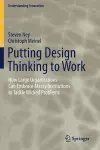
Putting Design Thinking to Work
2 authors - Paperback
£49.99
Professor Dr. Christoph Meinel (Univ. Prof., Dr. sc. nat., Dr. rer. nat., 1954) is Dean of the Digital Engineering Faculty of the Potsdam University and Director and CEO of the Hasso Plattner Institute for Digital Engineering gGmbH (HPI) and a full professor (C4) for computer science and serves as department chair of Internet Technologies and Systems at HPI. Beside he is a teacher at the HPI School of Design Thinking, he is an honorary professor at the Department of Computer Sciences at Beijing University of Technology and a guest professor at Shanghai University. Christoph Meinel is a research fellow at the Interdisciplinary Centre for Security, Reliability and Trust (SnT) at the University of Luxembourg. Meinel is a member of acatech, the German “National Academy of Science and Engineering,” and numerous scientific committees and supervisory boards.Together with Larry Leifer from Stanford University he is program director of the HPI-Stanford Design Thinking Research Program. He is scientifically active in innovation research on all aspects of the Stanford innovation method “Design Thinking.”Christoph Meinel is author/co-author of 9 books and 4 anthologies, as well as editor of various conference proceedings. More than 400 of his papers have been published in high-profile scientific journals and at international conferences. He is also editor-in -chief of “ECCC – Electronic Colloquium on Computational Complexity,” “ECDTR – Electronic Colloquium on Design Thinking Research,” the “IT-Gipfelblog” and the tele-TASK lecture archive and openHPI.
Larry Leifer is professor of Mechanical Engineering at Stanford University, CA, USA. Dr. Leifer's engineering design thinking research is focused on instrumenting design teams to understand, support, and improve design practice and theory. Specific issues include: design-team research methodology, global team dynamics, innovation leadership, interaction design, design-for-wellbeing, and adaptive mechatronic systems. Dr. Leifer has taught Design Innovation for decades and continues to redesign the course ever year with new methodologies and technologies. Once a design student himself at Stanford University, he has started many design initiatives at Stanford including the Smart-Product Design Program, Stanford-VA Rehabilitation Engineering Center, Stanford Learning Laboratory, and most recently the Center for Design Research (CDR). A member of the Stanford faculty since 1976, his research themes include: creating collaborative engineering environments for distributed product innovation teams, instrumentating that environment for design knowledge capture, indexing, reuse, and performance assessment, and design-for-wellbeing, socially responsible and sustainable engineering.